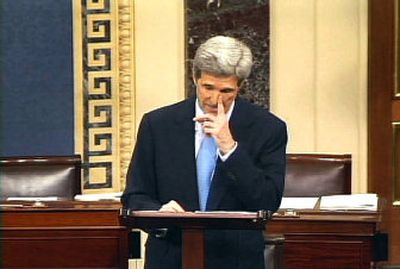Kerry rules out 2008 bid

WASHINGTON – Sen. John Kerry of Massachusetts ruled out a second presidential bid Wednesday, asserting that he could do more to change the course of Iraq policy in the Senate than by campaigning in Iowa and New Hampshire.
“I’ve concluded this isn’t the time for me to mount a presidential campaign,” Kerry said on the Senate floor. “I intend to work here to change a policy in Iraq that threatens all that I have worked for and cared about since I came home from Vietnam.”
Since his 2004 loss to President Bush, Kerry had left open the possibility of a return run for national office. He had emerged as one of the most vociferous voices in opposition to the war in Iraq and spent much of the 2006 election traveling the country in support of Democratic candidates. Much of that work was forgotten when, a little more than a week before the election, he made a remark that Republicans said disparaged U.S. troops in Iraq. He insisted it was nothing more than a botched joke but quickly apologized.
Several people close to Kerry said he struggled with the decision over whether to run again, weighing the narrowness of his 2004 defeat with the obvious hurdles that a field filled with popular figures such as Sens. Hillary Rodham Clinton, N.Y., Barack Obama, Ill., and former Sen. John Edwards, N.C., presented. Kerry acknowledged as much in his remarks, saying, “We came close, certainly close enough to try again.”
The sources said his decision was not motivated by national and state polling that showed him trailing Clinton, Obama and Edwards in hypothetical 2008 matchups, pointing out that Kerry had nearly $13 million in the bank that could have been used to reintroduce himself to voters. But there were also real concerns that a second national candidacy could endanger Kerry’s standing in his home state as well.
“Like a very smart fighter, (Kerry) made the best long-term decision for himself and the country by recognizing where the real battlefield is on the Iraq war,” said Jenny Backus, a former Kerry adviser who is currently neutral in the 2008 race.
Kerry is expected to run for a fifth Senate term in 2008 and made clear during his speech that he would continue to forcefully oppose the foreign policy course pursued by the Bush administration.
“It’s not enough for Congress to go on record opposing the President’s reckless plan,” Kerry said, adding that he supported a measure that would require congressional authorization for further troop build-ups in Iraq.
In an e-mail sent to past supporters announcing his decision, Kerry unveiled a new online grass-roots effort, which is being run by progressive blog guru Jerome Armstrong, calling for “co-sponsors” to legislation he plans to introduce aimed at forcing President Bush to set a timetable for the withdrawal of American troops from Iraq. That proposal mirrors one Kerry offered last April that would have mandated all U.S. forces be out of Iraq by the end of 2006; it failed 83-16 in a June Senate vote.
Edwards, who was Kerry’s running mate in 2004, called the Massachusetts senator a “friend” and noted that “all Americans are fortunate to have John’s experience, insight and conscience in the Senate.”
Many Democrats regarded Kerry’s decision as a foregone conclusion because of the competitive field, his baggage from the 2004 election and the historical unwillingness of the Democratic Party to renominate a losing candidate for president.
Stephanie Cutter, Kerry’s national spokeswoman in 2004, praised the senator for the campaign he ran but added, “The reality is the 2008 race moved past him months ago, and catching up would haven taken much more than another candidate’s implosion or last-minute surge.”